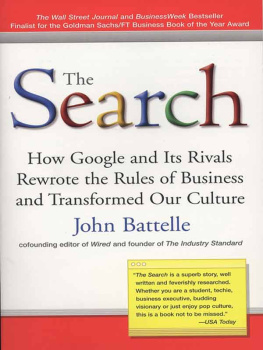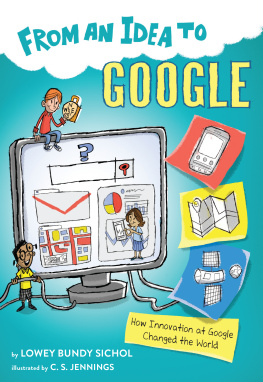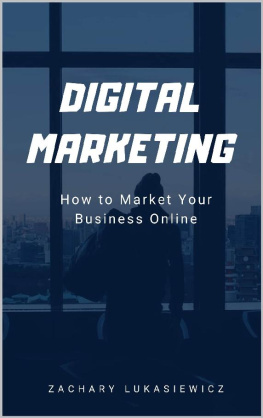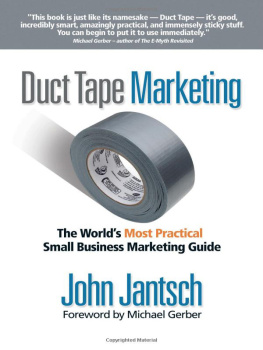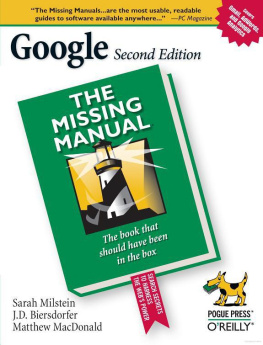The Search

The Search
How Google and Its Rivals Rewrote the Rules of Business and Transformed Our Culture
John Battelle
Portfolio
PORTFOLIO
Published by the Penguin Group
Penguin Group (USA) Inc., 375 Hudson Street,
New York, New York 10014, U.S.A.
Penguin Group (Canada), 90 Eglinton Avenue East, Suite 700,
Toronto, Ontario, Canada M4P 2Y3 (a division of Pearson Penguin Canada Inc.)
Penguin Books Ltd, 80 Strand, London WC2R 0RL, England
Penguin Ireland, 25 St. Stephens Green, Dublin 2, Ireland (a division of Penguin Books Ltd)
Penguin Books Australia Ltd, 250 Camberwell Road, Camberwell,
Victoria 3124, Australia (a division of Pearson Australia Group Pty Ltd)
Penguin Books India Pvt Ltd, 11 Community Centre, Panchsheel Park, New Delhi110 017, India
Penguin Group (NZ), Cnr Airborne and Rosedale Roads, Albany,
Auckland 1310, New Zealand (a division of Pearson New Zealand Ltd)
Penguin Books (South Africa) (Pty) Ltd, 24 Sturdee Avenue,
Rosebank, Johannesburg 2196, South Africa
Penguin Books Ltd, Registered Offices:
80 Strand, London WC2R 0RL, England
First published in 2005 by Portfolio,
a member of Penguin Group (USA) Inc.
Copyright John Battelle, 2005
All rights reserved
An extension of this copyright page appears before the Index Section.
Library of Congress Cataloging-in-Publication Data
Battelle, John, 1965
The Search: how Google and its rivals rewrote the rules of business and transformed our culture / John Battelle
p. cm.
Includes index.
Contents: The database of intentionsWho, what, where, why, when, and how (much)Search before GoogleGoogle is bornA billion dollars, one nickel at a timeGoogle 20002004: zero to $3 billion in five yearsThe search economySearch, privacy, government, and evilGoogle goes publicGoogle today, Google tomorrowPerfect search.
ISBN: 978-1-1012-1841-9
1. Google (Firm) 2. Internet industryUnited States. 3. Web search engines. 4. Google. 5. Internet searching. 6. Information societyUnited States. I. Title: Google and its rivals rewrote the rules of business and transformed our culture. II. Title.
HD 9696.8.U64G633 2005
338.7'6102504'0973dc22 2005047538
Without limiting the rights under copyright reserved above, no part of this publication may be reproduced, stored in or introduced into a retrieval system, or transmitted, in any form or by any means (electronic, mechanical, photocopying, recording, or otherwise), without the prior written permission of both the copyright owner and the above publisher of this book.
The scanning, uploading, and distribution of this book via the Internet or via any other means without the permission of the publisher is illegal and punishable by law. Please purchase only authorized electronic editions and do not participate in or encourage electronic piracy of copyrighted materials. Your support of the authors rights is appreciated.
For Michelle
Contents
Chapter 1
The Database of Intentions
The library of Alexandria was the first time humanity attempted to bring the sum total of human knowledge together in one place at one time. Our latest attempt? Google.
Brewster Kahle, entrepreneur and founder, the Internet Archive
Everyone their own Boswell.
Geoffrey C. Bowker, Department of Communication, University of California, San Diego
B y the fall of 2001, the Internet industry was in full retreat. Hundreds of once promising start-upsmine among themlay smoldering in bankruptcy. The dreams of Internet riches, of changing the world of business and reshaping our culture in the process, dreams celebrated in magazine cover stories and television specials and unheard-of stock market valuations, well, those dreams were stone-cold dead.
Still smarting from the loss of my own Internet business1 and wondering whether the Internet story could ever pick itself up off the ground, I stumbled across a link to the first edition of Google Zeitgeist. Zeitgeist is a clever public relations tool that summarizes search terms that are gaining or losing momentum during a particular period of time. By watching and counting popular search terms, Zeitgeist provides a fascinating summary of what our culture is looking for or finds interesting, and, conversely, what was once popular that is losing cultural momentum.
Since 2001, Google has maintained a weekly Zeitgeist on its press relations site, but the link I found was the companys first-ever version of the tool, and it summarized the entire year.2 And what a year 2001 was! Listed among the top gaining queries were Nostradamus (number one), CNN (number two), World Trade Center (number three), and anthrax (number five). The only term to break into the top five that was not related to the terrorist attacks? A collective fantasy about magic and children, Harry Potter , at number four.
The fastest-declining queries demonstrated how quickly our culture was abandoning frivolity: Pokemon was number one, followed closely by Napster, Big Brother (a reality television show), X-Men, and the woman who won Who Wants to Marry a Multi-Millionaire.
I was transfixed. Zeitgeist revealed to me that Google had more than its finger on the pulse of our culture, it was directly jacked into the cultures nervous system. This was my first glimpse into what I came to call the Database of Intentionsa living artifact of immense power. My God, I thought, Google knows what our culture wants! Given the millions upon millions of queries streaming into its servers each hour, it seemed to me that the company was sitting on a gold mine of information. Entire publishing businesses could be created from the traces of intent evident in such a database; in fact, Google had already started its first: a beta project called Google News . Could it not also start a research and marketing company capable of telling clients exactly what people were buying, looking to buy, or avoiding? How about starting an e-commerce firm that already knew what the buyer wanted? How about a travel business that knew where the customer wanted to go? The possibilities, it seemed, were endless.
Not to mention that within Googles rich database lay potential fieldwork for thousands of doctorates in cultural anthropology, psychology, history, and sociology. This little company, I thought to myself, rapt and a bit naively, is holding the world by the thoughts. Ive got to go see it. Maybe the dot-com dream wasnt dead; perhaps it had simply been hiding behind the implacable facade of a Google search box.
I remembered that back in April 2001, Eric Schmidt, a founder of Sun Microsystems, had left his job running Novell, the perpetually struggling networking giant, and accepted the chairman and CEO role over at Google (the industry was baffled by the move, but well get to that story later). I knew Eric somewhat, as I covered Novell and Sun while I was a trade reporter, and ran into him at various conferences during my career as an editor and publisher. I decided to take a chance and shoot him an e-mail. I really had no idea what I wanted to talk about, other than my nascent sense that he was onto something big.3 Google, it seemed, was thriving. I had heard that it was pretty much the only place left in the Valley that was hiring engineers. Eric agreed to a meeting, and in early 2002, we sat down for the first of several intriguing talks.
Eric Looks for the Billion-Dollar Opportunity
When we met, I hadnt yet figured out I wanted to write this book, but I was headed that way. I introduced my concept of the Database of Intentions and spoke of how Zeitgeist scratched the surface of what seemed to be a massive new wealth of cultural understanding. As we spoke, I outlined how Google might create a media division to tap into that resource. Yahoo had already declared itself a media company, so why not Google? While Eric agreed that the data collected by Google was impressive, he didnt see the point of starting a media business. Google was a technology business, he told me. Media is best left to people like you, he added.

